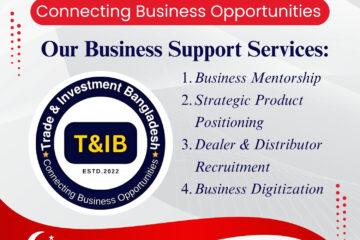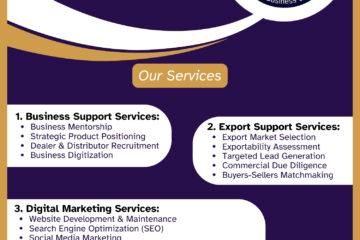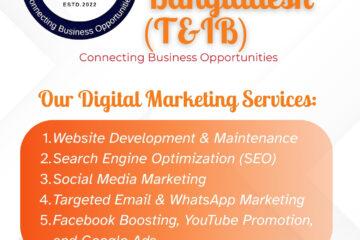Elevating Your Business with a Smart Distribution Channel
Md. Joynal Abdin*
Business Consultant & Digital Marketer
Co-Founder & CEO of Bangladesh Trade Center
Introduction:
In the dynamic landscape of business, where competition is fierce and consumer preferences constantly evolve, the success of a company hinges on its ability to adapt and strategically position itself. One pivotal element that plays a monumental role in achieving this adaptability and strategic positioning is the development of a smart distribution channel. As businesses strive to reach wider audiences, optimize their reach, and maximize profitability, the importance of an effective distribution strategy cannot be overstated.
At its core, a distribution channel serves as the bridge connecting a product or service to its end consumers. However, the concept of a smart distribution channel transcends the mere logistics of delivering products; it encapsulates a comprehensive strategy that encompasses market analysis, consumer behavior understanding, and a keen awareness of industry trends. This strategic approach is designed to not only streamline the process of getting products into the hands of consumers but also to ensure that the products are positioned strategically to meet the ever-changing demands of the market.
The crux of elevating your business with a smart distribution channel lies in the meticulous planning and execution of a well-tailored strategy. This involves selecting the most appropriate distribution channels based on the nature of the product, target market demographics, and the overall business objectives. Whether it’s through direct sales, partnerships, e-commerce platforms, or a combination of these, each channel contributes uniquely to the brand’s visibility and accessibility.
Furthermore, the symbiotic relationship between distribution channel development and product positioning is paramount. Smart distribution goes hand in hand with positioning products in a way that resonates with the target audience, creating a distinct identity in a crowded market. In this era of hyper-connectivity and rapid technological advancements, businesses that harness the power of smart distribution channels gain a competitive edge, not only in terms of reach but also in cultivating a brand image that stands out in the minds of consumers.
In the subsequent exploration of this topic, we will delve deeper into the intricacies of developing smart distribution channels and how this critical component can propel businesses towards sustained growth and success in an ever-evolving marketplace.
Types of Distribution Channels:
Distribution channels, also known as marketing channels, play a vital role in getting products from manufacturers to end consumers efficiently. These channels form the network through which goods and services move, and they vary in complexity depending on the nature of the product, industry dynamics, and target market. Here’s an exploration of the primary types of distribution channels:
- Direct Sales Channel: In a direct sales channel, the product moves directly from the manufacturer to the end consumer without any intermediaries. For Example; Tesla, the electric car manufacturer, sells its vehicles directly to customers through its own showrooms and online platform.
- Retailer Channel: Retailers act as intermediaries between manufacturers and consumers. Products are sold to retailers, who then sell them to end consumers. For Example; Electronics manufacturers often distribute their products through major retail chains such as Best Buy or Walmart.
- Wholesaler Channel: Wholesalers purchase large quantities of products from manufacturers and sell them to retailers. This channel is common when dealing with bulk quantities. For example; Food manufacturers may sell their products in bulk to wholesalers who, in turn, distribute them to grocery store chains.
- Agent/Broker Channel: Agents or brokers act as intermediaries who facilitate the sale between the manufacturer and the end consumer. They earn a commission for their services. For Example; Real estate agents facilitate the sale of properties between sellers and buyers, earning a commission on successful transactions.
- Dual Distribution: In this channel, a manufacturer uses more than one distribution channel to reach the same target market. For example; A book publisher may sell books directly to consumers through their website while also distributing to bookstores through a wholesaler.
- Online Sales Channel: With the rise of e-commerce, online sales channels involve selling products directly to consumers through digital platforms. For example; Amazon serves as an online sales channel for various manufacturers and retailers, offering a platform for a wide range of products.
- Franchising: Franchising involves the use of independent business operators (franchisees) who sell or distribute products under the brand of a larger franchisor. For example; Fast-food chains like McDonald’s or Subway often use franchising as a distribution strategy to expand their reach.
- Specialized Distribution: This channel involves using specialized intermediaries or distributors who focus on a specific market segment or industry. For example; Medical equipment manufacturers may use specialized distributors who have expertise in the healthcare industry to reach hospitals and clinics.
- Agent-Owned Inventory Channel: Agents take ownership of the product and maintain an inventory that they sell directly to retailers or consumers. For Example; Some fashion brands may have agents who purchase and carry inventory to showcase and sell products to boutique stores.
Choosing the most suitable distribution channel is a critical strategic decision for businesses. It depends on factors such as the nature of the product, target market characteristics, cost considerations, and overall business objectives. Successful companies often employ a combination of these distribution channels to maximize their reach and cater to diverse consumer preferences.
Common Steps of Distribution Channel Development:
Developing an effective distribution channel is a strategic process that involves careful planning, collaboration, and execution. The steps outlined in the distribution channel development process ensure that products reach the target market efficiently and in a manner that aligns with overall business objectives. Here are the common steps of distribution channel development:
- Market Analysis: Understanding Consumer Needs, Begin by conducting a thorough analysis of the target market. Identify consumer needs, preferences, and behaviors to tailor the distribution strategy accordingly. Evaluate the competition to identify existing distribution channels in the market. Assess what works well and areas where there might be gaps or opportunities for improvement.
- Set Clear Objectives: Clearly define the objectives of the distribution channel. These objectives should align with the overall business goals and may include expanding market reach, increasing sales, or improving customer service. Choose the most appropriate distribution channels based on the nature of the product, target audience, and market conditions. Options include direct sales, retail, online sales, wholesalers, agents, and more.
- Establishing Relationships: Build strong relationships with channel partners. Whether dealing with retailers, wholesalers, or agents, open and transparent communication is key. Establishing mutual trust and understanding ensures a smoother distribution process.
- Legal and Regulatory Compliance: Ensure compliance with legal and regulatory requirements in all relevant markets. This includes understanding import/export regulations, licensing, and any industry-specific standards or certifications.
To read 2nd part of this article, click here!
Elevating Your Business with a Smart Distribution Channel: Elevating Your Business with a Smart Distribution Channel
Mr. Md. Joynal Abdin stands as a prominent Business Consultant and Digital Marketer hailing from Dhaka, Bangladesh. He holds the role of Founder and CEO at Trade & Investment Bangladesh. With an extensive professional journey, he has contributed significantly, having served as Executive Secretary at Dhaka Chamber of Commerce & Industry (DCCI), Executive Director at DCCI Business Institute (DBI), Deputy Manager at SME Foundation, and Assistant Secretary at the Federation of Bangladesh Chambers of Commerce & Industry (FBCCI).
Mr. Abdin’s diverse array of services encompasses, but is not confined to, Business Research and Documentation, such as Feasibility Studies, Project Proposal Preparation, and Business Manual and Standard Operating Procedures writing. He is also adept at Export Market Selection, Product Positioning both domestically and internationally, Buyers-Sellers Matchmaking, Website Development, Search Engine Optimization (SEO), and Social Media Marketing, among other valuable offerings.

![Elevating Your Business with Smart Distribution Channel [P-1]](https://mdjoynalabdin.com/wp-content/uploads/2023/07/Md.-Joynal-Abdin-4-300x296.webp)



0 Comments